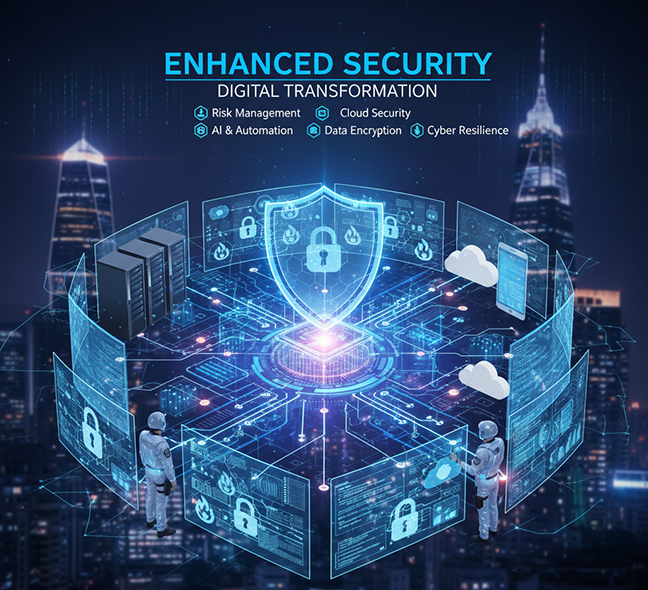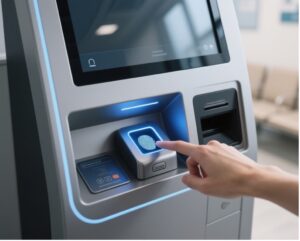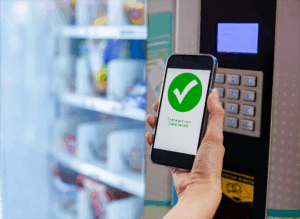
News & Updates

How can organizations enhance security during digital transformation?
Organizations can enhance security during digital transformation by integrating robust cybersecurity practices at every phase of the process, rather than treating security as a secondary concern. This approach involves implementing modern security frameworks, leveraging advanced technologies, and fostering a security-aware culture throughout the enterprise.
As digital transformation introduces new risks such as data breaches, cyberattacks, and regulatory challenges proactive security measures become essential for protecting sensitive information, preserving customer trust, and ensuring operational resilience. ATT Group, a trusted leader in smart and secure technology solutions, exemplifies how organizations can safeguard their digital transformation journeys through end-to-end, customizable, and ISO- certified security management strategies.
What are the key security challenges in digital transformation?
The key security challenges in digital transformation are increased vulnerability to cyber threats, complexity in managing hybrid environments, and the risk of regulatory non- compliance. Digital transformation exposes organizations to a broader attack surface, including cloud platforms, IoT devices, and remote endpoints.
As organizations adopt AI, cloud computing, and IoT, they must address threats such as unauthorized data access, malware, and phishing. These technologies require careful configuration and ongoing monitoring to prevent exploitation. Regulatory frameworks like GDPR and ISO/IEC 27001 demand stringent data protection measures, making compliance a critical aspect of digital security.
- Expanded attack surface due to integration of new technologies
- Complexity in securing multi-cloud and hybrid environments
- Increased risk of insider threats and human error
- Challenges in meeting regulatory and industry standards
Understanding these challenges enables organizations to design security strategies that address both technical and human factors, forming the foundation for safe digital transformation.
How can organizations implement effective security strategies during digital transformation?
Organizations can implement effective security strategies by adopting a zero-trust security model, encrypting sensitive data, and deploying AI-driven threat detection systems. Zero-trust architecture ensures that every access request is verified, regardless of user location or device. Data encryption protects information in transit and at rest, reducing the risk of data breaches.
AI-powered security platforms proactively identify and respond to threats, leveraging machine learning to detect unusual patterns. Regular audits, compliance checks, and bug bounty programmes identify vulnerabilities before they can be exploited.
- Zero-trust model for access control and identity verification
- End-to-end data encryption across systems and devices
- AI-driven threat detection and automated incident response
- Continuous security audits and compliance verification
Integrating these strategies ensures that security is embedded within every stage of the digital transformation journey, minimizing risks while maintaining agility and innovation.
What role do employee training and organisational culture play in digital security?
Employee training and organisational culture play a critical role in digital security by empowering staff to recognise and respond to cyber threats. Training programmes covering topics such as phishing awareness and secure password practices reduce the risk of human error, which remains a leading cause of security breaches.
Establishing a culture of security encourages proactive reporting of suspicious activity and ensures adherence to security protocols. Organisations that prioritise ongoing education and clear communication foster an environment where security is a shared responsibility. ATT Group supports clients by offering tailored training and resources, enabling teams to stay updated on the latest security best practices.
- Regular cybersecurity training for all employees
- Clear policies for reporting and handling security incidents
- Recognition and reward systems for security-conscious behaviour
- Leadership commitment to a culture of security
By cultivating a security-minded workforce, organisations can significantly reduce vulnerabilities and enhance overall resilience against cyber threats.
How does ATT Group support secure digital transformation?
ATT Group supports secure digital transformation by delivering customised, ISO-certified solutions that integrate advanced security management into every aspect of technology deployment. The company’s expertise spans Digital Services, Enterprise IT Systems, and Integrated Security Management ensuring that organisations benefit from modular, scalable platforms designed for security and compliance.
ATT’s approach includes deploying AI-powered platforms for real-time threat detection, implementing secure cloud configurations, and providing 24/7 technical support. Flagship offerings such as the Q’SOFT™ Intelligent Queue Management System exemplify ATT’s commitment to secure, efficient, and future-ready operations. By aligning with international standards and partnering closely with clients, ATT Group enables public and private organisations to achieve digital transformation without compromising security.
- Customisable security solutions tailored to client needs
- ISO/IEC 27001-certified information security management
- Integration of AI, robotics, and cloud technologies for proactive defence
- Dedicated support and long-term partnership focus
ATT Group’s expertise and commitment to excellence make it a trusted partner for organisations seeking to navigate digital transformation securely and confidently.
- Embedding security at every stage of digital transformation is essential for protecting assets and maintaining trust.
- Zero-trust models, AI-driven threat detection, and employee training are key strategies for mitigating risks.
- ATT Group delivers ISO-certified, customisable solutions that support secure and resilient digital transformation.
Taking action for a secure digital future
Enhancing security during digital transformation requires a strategic, all-encompassing approach that combines advanced technology, robust frameworks, and a strong security culture. By leveraging solutions like those offered by ATT Group customisable, ISO-certified, and supported by domain expertise organisations can confidently accelerate their digital journeys while mitigating risks. Looking ahead, the integration of AI, cloud platforms, and proactive training will further strengthen resilience, ensuring sustainable growth and operational excellence in a rapidly evolving landscape.
Contact ATT Group today at infosoft-sales@attsystemsgroup.com to discover how tailored, secure digital transformation solutions can empower your organisation for the future.
Frequently Asked Questions (FAQ)
Q: What are the most common security pitfalls organizations face during digital transformation?
A: Organizations often underestimate the complexity of securing hybrid environments and fail to address new threats like phishing and insider risks introduced by modern technologies.
Q: How does a zero-trust security model improve protection during digital transformation?
A: Zero-trust ensures every user and device is verified before granting access, reducing the chance of unauthorized entry or data breaches in evolving digital environments.
Q: Why is employee training crucial for digital transformation security?
A: Regular training helps staff recognize and report threats like phishing, minimizing human error and fostering a proactive security culture across the organization.
Q: How does ATT Group’s approach to security differ from other providers?
A: ATT Group offers ISO-certified, customizable solutions and 24/7 support, ensuring security is seamlessly integrated and maintained throughout the digital transformation process.
Q: What technologies should organizations prioritize for threat detection during digital transformation?
A: AI-driven platforms and automated incident response tools are essential for proactively identifying and addressing threats in real time.
Q: How can organizations ensure compliance with regulations like GDPR during transformation?
A: By embedding compliance checks, continuous audits, and certified security frameworks into each stage of transformation, organizations can meet regulatory requirements and avoid penalties.
Q: What steps can leadership take to foster a security-minded culture?
A: Leadership should provide ongoing education, clear reporting policies, and recognize security-conscious behaviors to make security a shared responsibility among all employees.
Contact ATT at infosoft-sales@attsystemsgroup.com for details.
Send us a message
Contact Information
Address:
35 Ubi Crescent, ATT Building, Singapore, 408585
Phone:
Email:
Website:
www.attsystemsgroup.com





